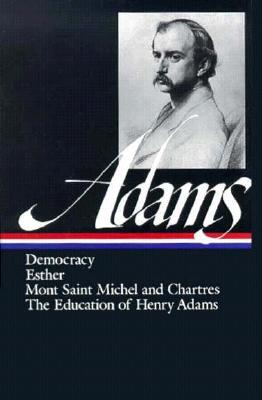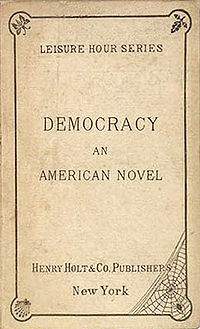The next volume of the Library of America that I will work on is one of the three they published collecting the works of Henry Adams. Two of these are his history of the early American Republic, which I will consider later. Today I will start looking at his novels and autobiographical writings, starting with Democracy: An American Novel (1880). Adams was a member of the political family founded by John Adams during the American Revolution. While his ambitions were literary and historical (his major work is a massive history of the United States in the age of Jefferson), he was not completely immune from the political life as his novel Democracy suggests. From his early years, he attacked the corrupting influence of money in politics in post-Civil War Washington. That we still fight these battles is either a source of fatalism about the possibility of a government of the people, or possibly a defense of these influences as natural or even necessary. An anarchist might read this text as a reminder of the importance of direct action and organization and the impossibility of democracy on a national scale.
The plot of the novel centers on a young widow, Lightfoot Lee, who invests her money and time to experience the life of Washington D.C. The narrator is not entirely sure of her motives, whether they were academic or ambitious. As we learn throughout the novel, there was a place for ambitious women who hoped to raise in Washington society through marriages to politicians. The narrator also begins by pointing out, that she did not find Europe a source of decadence and corruption. She simply chose to explore all that America had to offer. By the end of chapter one, we learn unequivocally that her desire to consume all that America offered was a cover for her true desires. “She replied that if Washington society were so bad as this, she should have gained all she wanted, for it would be a pleasure to return, — precisely the feeling she longed for. . . . What she wished to see, she thought, was the clash of interests, the interests of forty millions of people and a whole continent, centering at Washington; guided, restrained, controlled, or unrestrained and uncontrollable, by men of ordinary mould; the tremendous forces of government, and the machinery of society at work. What she wanted, was POWER.” (8) She quickly enters the social life of Washington and is immediately courted by diplomats and politicians. Most prominent among these is the Senator Silas P. Ratcliffe, who has presidential ambitions after narrowly missing his party’s nomination. To become president, he needs a wife and Lee seemed ideal. Ratcliffe is a great orator and full of traditional ideas. He is opposed to reforms in the civil service and suffrage laws (the major issues being debated in the backdrop of the novel). When talks come to new ideas such as Darwinism or communism, Ratcliffe is opposed on traditional and religious grounds. That said, he is fully corrupted, duplicitous, manipulative, and ambitions. When Lee learns of his corruption she rejects his offers of marriage and leaves Washington for Europe.
The relationship between Europe and America is a strong theme throughout the novel. In the early 19th century, people in the U.S. liked to think of themselves as different from Europeans: democratic, uncorrupted, and holders of a unique and distinct culture. It is in political and cultural life, more than anywhere else, that Americans expressed their independence from European corruptions. There are numerous Europeans in Washington as vagabonds or diplomats. They seem to bring European corruptions – reflected in the womanizing Baron Jacobi. But of course, Americans in Washington were not much better. Schuyler Clinton, from New York, apparently “made love to every girl with any pretensions to beauty that had appeared in the State of New York.” (16) Adams wanted to show the reader how life in Washington had much in common with European courts. Dynasties abounded, sycophants seeking jobs existed around every corner, parties for the rich and power seem to be the main events, and money – not the people – spoke. The Baron Jacobi made the point that America has actually outdid Europe in respect to corruption. “Well, I declare to you that in all my experience I have found no society which has had elements of corruption like the United States. The children in the street are corrupt, and known how to cheat me. The cities are all corrupt, and also the towns and the counties and the States’ legislatures and the judges. Everywhere men betray trusts both public and private, steal money, run away with public funds.” (38) Most of the characters in the novel seem to know this, or acts as through they do, even as they defend democracy. One more idealistic figure, Nathan Gore of Massachusetts (a scholar and historian like Adams), seems to believe in the real potential of democracy powered by educated people. Unfortunately, the reality is that the people of the United States just elected a incompetent Indiana farmer, who Ratcliffe is able to manipulate.
One corrupting element of democracy that Adams had a long argument against was the selection of civil servants based on political alliances, rather than merit. He argued for civil service reform in 1869. This is a theme of the novel, and talk of reform is in the air, but a large part of this short work concerns the transition to the new president and the jockeying for jobs that go on behind the scenes. Even the new president proclaims that the spoils system would be changed under his presidency, but any effort at reform fails.
We share Ratcliffe’s cynicism at the end. Lee can avoid corruption only by going to Europe. A new president matters little. New ideas falter in Washington and become only the discussions points of parties for the political elite. Even courtship serves political ends. He says at one point that a democracy can only be as good as the people in it. I suppose this is true that a few more people like Nathan Gore would have created a less corrupt government, but we cannot ignore the institutional arrangements that encourage corruption. These institutions are not analyzed or listed by Adams, but we know what they are. The political parties (that Ratcliffe thing trump all possible sources of loyalty, save the nation), the corporate influence, the bureaucratic class, and the physical and cultural separation of representatives and the people.
Personally, I have little to say in defense of American democracy and will today join with Adams in the condemnation of Washington.

